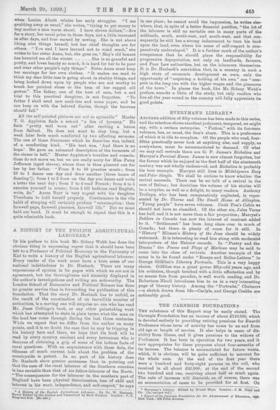A HISTORY OF THE ENGLISH AGRICULTURAL LABOURER.*
IN his preface to this book Mr. Sidney Webb has done the obvious thing in expressing regret that it should have been left to a Professor of Political Economy in the University of Kiel to write a history of the English agricultural labourer. Every reader of the work must have a been sense of our rational indebtedness to Dr. Hasbach. There are many expressions of opinion in its pages with which we are not in agreement, but the thoroughness and sincerity displayed in the author's investigations and writing are noteworthy. The London School of Economics and Political Science has done no greater service than in forwarding the publication of this translation. That the story Dr. Hasbach has to unfold, as the result of the examination of an incredible number of authorities, is a moving one will surprise no one who has read Mr. Jesse Collings's book, or any other painstaking work which has attempted to state in plain terms what the man on the land has come through during the last three centuries. While we repeat that we differ from the author on many points, and it is no doubt the case that be may be tripping in his history here and there, we hope that his book will be read by every country resident and every townsman who is desirous of obtaining a grip of some of the bottom facts of rural questions. With an acquaintance with these data, the idleness of much current talk about the problem of the countryside is patent. In no part of his history does Dr. liasbach show greater acuteness than in pointing out that the case of the rural labourer of the Southern counties is less enviable than that of his fellow-labourer of the North. "The consequences for the labourer in the southern part of England have been physical deterioration, loss of skill and interest in his work, independence, and self-respect," he says • A History of the Ettglmla Agricultural Labourer, By Dr. W. HasbReb. Newly Edit&I by the Author and Translated by Huth Kenyon. Loudon ; 1'. S. King and Son. Ns. net.)
in one place; he cannot avoid the impression, he writes else- where, that, in spite of a better financial position, "the lot of the labourer is still no enviable one in many parts of the midlands, south, south-east, and south-west, and that con- sequently he still has a strong inducement to turn his back upon the land, even where his sense of self-respect is com- paratively undeveloped." It is a further mark of the anther's competence that he should place the responsibility for progressive depopulation, not only on landlords, farmers, and Poor Law authorities, but on the labourers themselves. It is Dr. Haabach's conviction that, in a country in such a high state of economic development as ours, only the opportunity of "acquiring a bolding of his own" can "com- pete in the long run with the higher wages and the pleasures of the town." In places the book, like Mr. Sidney Webb's preface, smacks a little of the study, but only readers who live all the year round in the country will fully appreciate its good points.










































 Previous page
Previous page